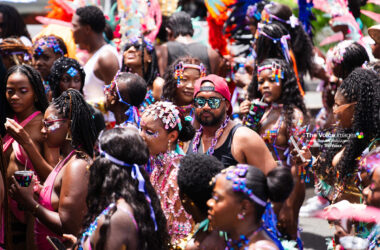The world needs to come to the aid of Haiti NOW. Not tomorrow. The country is rapidly sinking into anarchy while the mighty powers of the world watch, all the time claiming to be ‘helping’ but not really providing the type of help Haiti needs to break the chains of poverty and misery binding it.
An incredible country with an amazing history, Haiti was once known as ‘The Pearl of the Antilles’ on account of its wealth as a colony of France back in the 1800s.
Haiti’s past is not only intriguing but filled with injustices, economic and other.
It all began when Toussaint L’ Ouverture, also known as the ‘Black Napoleon’, a former slave led a revolution that overthrew the French Colonizers in the Haitian Revolution (August 21, 1791 – January 1, 1804). A series of unfortunate events linking back to that revolution dismantled Haiti’s economic power to the point that today it is said to be the Western Hemisphere’s poorest country.
At the time of Haiti’s revolt, the then President of the United States, Thomas Jefferson, fearing that the revolution in Haiti would spread to the United States, imposed economic sanctions against Haiti. France, in turn, blocked Haiti from participating in the trans-Atlantic trade, signaling the start of a global isolation that plummeted Haiti into a downward economic spiral.
According to exceptionalcaribbean.com, to make matters worse, under threat of war, Haiti was forced by France in 1825 to pay 150 million Francs, which was later reduced to 90 million Francs in 1838. This is the 2021 equivalent of US$30 billion (based on calculations by Leve Global). This payment was to compensate France for its loss of slaves and its slave colony. In addition to the payment, France demanded that Haiti cut its export prices in half for commodities sold to them, making repayment more challenging for Haiti. Haiti’s debt was finally paid off more than one hundred years later in 1947, and its economy is yet to recover from this devastating and debilitating blow.
The country is known for its poverty, inequality and thriving upper class. It has been reported that in 2020, 60% of the Haitian population lived under the poverty line. And according to the World Bank, Haiti is considered as the #1 country in Latin America and the Caribbean with the most uneven distribution of wealth. It has the largest disparity between the upper classes and the poorer echelons of the society. In Haiti, the richest 20% owns 64% of its total wealth, while the poorest 20% barely owns 1%.
The oppressive factors like the political and economic systems which have dominated Haiti over the years are human made, spanning corruption, invasion, occupation, protests, revolts, military rule, mayhem, terror, human rights abuses, violence, massacres, resistance, resilience, state of emergencies, coups and assassinations. Haiti has had it all.
The country is now battling gang violence. It has been said that years of political dysfunction in Haiti, combined with deteriorating economic conditions, the COVID-19 pandemic and natural disasters, weakened state power. Under these conditions, gangs have multiplied, joined forces and asserted authority in an increasingly destructive manner.
According to globalinitiative.net in the last five years, gangs have grown rapidly in number, expanding their territories and tightening their control over Haiti’s political and economic infrastructure. They have established themselves as the mercenary partners of politicians and state administrators, as mafia-style armed groups profiting from the private sector and as the local coordinators of international criminal networks.
A BBC Correspondent in Haiti reported that it is the gangs that function, rather than the State. Prime Minister Ariel Henry cannot even reach his own office because armed groups control the area.
Haiti’s government – such as it is – has issued “a distress call” for an international force to help restore order.
There’s talk at the United Nations about the need for a non-UN armed force, but no-one seems in a hurry to lead it, or even to take part.
Foreign interventions have a bad name, and a bad history in Haiti. The last UN mission is remembered for allegations of sexual abuse, and for bringing cholera to Haiti, via UN peacekeepers from Nepal. The epidemic killed around 10,000 people.
In Haiti there are mixed views on the idea of foreign boots on the ground. There’s support from some in business – who have used armed groups but now want them reigned in – and from those trapped in gang-controlled areas. There’s opposition from civil society leaders who say Haiti needs to go it alone.
“While the international community debates and demurs, it is massacres as usual for the gangs,” notes the BBC correspondent.
The correspondent added that local sources say armed groups are brutally expanding their territory because elections are overdue. When politicians come looking for votes – in gang held areas – they must pay off the gunmen.
Clearly the world needs to get involved in the Haiti story by dismantling the gangs and investing in building a strong democracy, not one dictated by the wealthy, gangs, and other despotic factors.
The powers which stripped Haiti of social and economic development should now own up to their transgressions against Haiti, and purpose to embark on policies aimed at eradicating poverty and dependency, and to provide aid that is sustainable to the Haitian people.
It is critical that the rich countries of the world play a more proactive role in lifting Haiti from the depths of misery and despair it is presently in, because were it not for some of them, particularly France and the United States, Haiti would not be in its current state of dysfunctionality.
The international community is not the only one to shoulder that burden. The 10% of Haitians that are doing very, very well should also do their share to bring order and prosperity to their country. How can they sleep at night when the rest of Haiti is hurting?




![MSS takes on VPSS in an action thriller [Photo credit: MYDS]](https://thevoiceslu.com/wp-content/uploads/2026/02/MSS-takes-on-VPSS-in-an-action-thriller-feat-380x250.jpg)
![Tapon House recorded its fourth consecutive title victory [Photo credit: MYDS]](https://thevoiceslu.com/wp-content/uploads/2026/02/Tapon-House-recorded-its-fourth-consecutive-title-victory-380x250.jpg)







